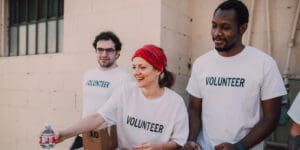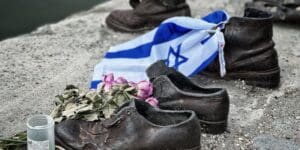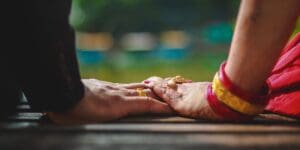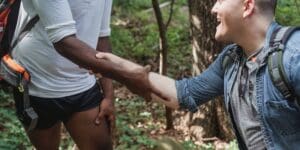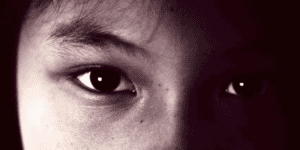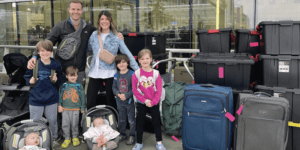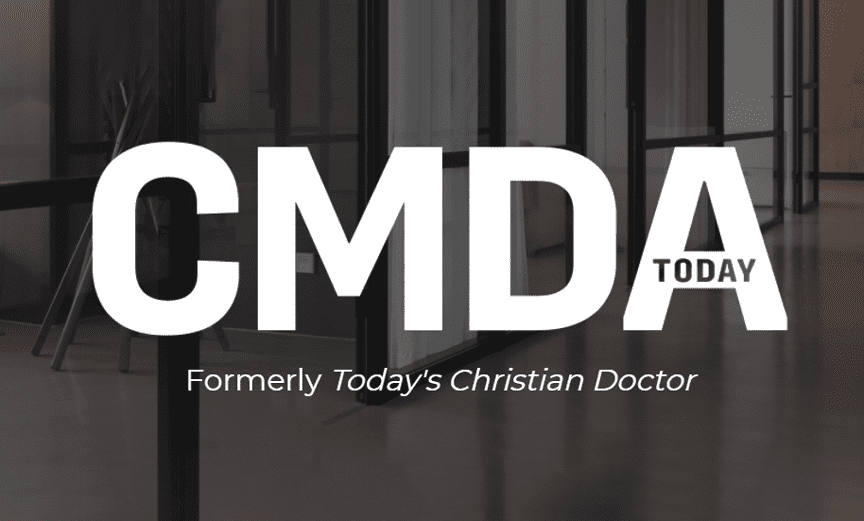
But God: Finding the Silver Lining
I remember early on hearing in the news about a virus causing problems in China. It wasn’t long before we heard news of it spreading. As it began to spread, we were busy planning for March, our busiest month of mission trips. We send the most teams in the month of March, which gives mission opportunities for various schools during the annual spring break period. We sent our first two teams out before countries began closing their borders. While these two teams were still out of the country, we began cancelling our remaining trips. First it was for the month, then it became two and on through the summer. Before we knew it, we had cancelled every single remaining mission trip scheduled throughout the remainder of 2020—all as a result of COVID-19.
I remember early on hearing in the news about a virus causing problems in China. It wasn’t long before we heard news of it spreading. As it began to spread, we were busy planning for March, our busiest month of mission trips. We send the most teams in the month of March, which gives mission opportunities for various schools during the annual spring break period. We sent our first two teams out before countries began closing their borders. While these two teams were still out of the country, we began cancelling our remaining trips. First it was for the month, then it became two and on through the summer. Before we knew it, we had cancelled every single remaining mission trip scheduled throughout the remainder of 2020-all as a result of COVID-19.
For Global Health Outreach (GHO), the arrival of the pandemic and the ensuing global shutdown in March 2020 brought us to a complete standstill. As one of CMDA’s short-term mission programs, the vast majority of our ministry efforts are dependent on our ability to travel, to go out to the nations and to use our healthcare skills to meet the needs of the least, the lost and the last around the world.
The shutdown was heartbreaking.
Heartbreaking for our ministry, heartbreaking for our staff members, heartbreaking for our team members, heartbreaking for the national partners we work with all across the world.
As more and more trips were cancelled, we grew more and more disappointed and disheartened. It felt as though we were being told we could no longer follow the call God has placed on our hearts to serve Him through healthcare missions. How could this be happening?
How many times do we see those two words in Scripture? It’s all throughout the Bible, in both the Old Testament and the New Testament.
- “You intended to harm me, but God intended it for good to accomplish what is now being done, the saving of many lives” (Genesis 50:20).
- “But God demonstrates his own love for us in this: While we were still sinners, Christ died for us” (Romans 5:8).
- “When they had carried out all that was written about him, they took him down from the cross and laid him in a tomb. But God raised him from the dead” (Acts 13:29-30).
How many times do we see God take what the enemy meant for evil and turn it into good throughout Scripture? And how many times have we seen God work like this in our own lives? Even if we can’t see it, God is always working behind the scenes. And in the midst of shutdowns and social distancing and masks and so many deaths…and all the rest that impacted our world through COVID-19, we searched for His will. “Where are you in all of this?” we asked.
While the eyes of our country were on epicenters like New York and New Jersey, the Navajo Nation was quickly and quietly becoming the third highest hotspot in the United States for the virus. The Navajo Nation is an American Indian territory covering approximately 17 million acres, occupying portions of Arizona, Utah and New Mexico. It is the largest land area retained by an indigenous tribe in the U.S. That’s when Ron received a phone call from Dr. Charles Bruerd, a physician who has served with GHO on several mission trips. He wanted to know if GHO could help by sending team members to assist our “First Americans” in the Navajo Nation.
For Ron, it was an eye-opening phone call. Ron and his wife Becky served for 10 years from 1975 to 1985 at Southwest Indian School (SIS), a boarding school in Phoenix, Arizona, as teachers, dorm parents, coach and cheerleading sponsor, among other responsibilities. They still keep up with many of their graduates, and they return every four to five years for an annual missions conference in Arizona.
As the numbers continued to rise on the Navajo reservation, Ron started making phone calls, including reaching out to Tim, his younger brother, who is still a missionary working with Native tribes in both the U.S. and Central America. Thanks in part to Tim’s strategic connections, Ron finally connected with Indian Health Services in the Navajo area, only to discover that the director was one of his former biology students and a former cheerleader on Becky’s squad.
Those providential connections helped us quickly work out the logistics of sending individual team members to the Navajo area for two-week segments (instead of full teams like we normally send overseas). One of the obstacles in the beginning was finances, but God worked that out as well. COPE, a non-profit organization, offered to help pay costs for volunteers to the Navajo Nation during this crisis. They arranged for and paid airline tickets, rental cars and lodging expenses. So, our volunteers only had to pay for their food and meals. What a wonderful gift!
As GHO Director, I was able to go in and “test the waters” early, so to speak, by being the first volunteer to serve in Navajo Nation. As an emergency medicine physician, I served in the emergency department in Shiprock, New Mexico for a two-week assignment. Quickly after this, GHO sent in physicians, pharmacists, nurses and even social workers, some who served back-to-back segments, totaling a month of volunteer service. The staff at the hospitals in the Navajo area were doing a good job of treating COVID-19 patients, but they were simply overwhelmed with the sheer volume of patients. The Navajo people were kind and gracious to volunteers, and they organized and distributed volunteers around the needed hospitals, with GHO sending team members to Shiprock, Gallup and Chinle within the Indian Health Services. Our GHO volunteers provided relief for their staff and filled in holes in the staffing schedule. Seeing the fear in the people and watching them struggle to breathe as they fight this virus is a tremendous strain on healthcare workers.
We were just one of many organizations helping to provide relief, and it was nice to meet volunteers from other organizations. I know I wasn’t the only one who arrived with no idea about the real plight of the Navajo.
The area was so barren, the conditions often poor and the needs so great. I kept having to remind myself that I was in the U.S. and not a developing country. They struggle to find water, often having to drive miles to fill up their tanks. As you can imagine, this made frequent handwashing and sanitation difficult. They often do without electricity and rely on generators. They commonly live multiple generations in one dwelling, making quarantining the elderly difficult. Regardless of the circumstances, they needed help, and they needed hope. They need Jesus. And as always, it was a privilege to serve as His hands and feet to a hurting world. It was a good reminder that you don’t have to travel far to help someone in need, here in the U.S. or anywhere else.
My first shift in the emergency department started with an amazing experience. A medicine man walked in to visit the emergency department. He wished to thank those who were working tirelessly to help his people. He had a plate much like a fajita plate with a cast iron hot plate held in a wooden tray. On this he was sprinkling herbs that would start smoking. He used a large feather to wave the smoke toward us as we circled around him. Many did a waving motion as if to draw the smoke toward themselves. He did a traditional Navajo chant and prayer over us and then spoke in English thanking us for the work we were doing for his people. He was humble, kind and so very gracious. I found out that another respected medicine man had recently passed from COVID. The culture is so different-the older people don’t like modern medicine. In many ways, they live in fear. So, the medicine man had set up his own “practice” in the hospital facility, trying to encourage the elders among his people to come for help. I was really touched by his compassion and commitment to the people he loved. Somehow, seeing that gave me an even stronger love for them, too.
In the midst of treating so many patients, we had the opportunity to learn some of the cultural differences of the Navajo people. Some, typically the elderly, preferred the traditional Navajo medicine while others preferred modern medicine. Simple things such as direct eye-to-eye contact with others is not common among them, or a handshake is typically a touching of the hands instead of a firm handshake. We learned that conversational courtesies so common to us, such as please or thank you, are infrequently shown by their people. Nevertheless, they certainly know how to express their appreciation in other ways, which we saw as we served alongside them and cared for the Navajo each day.
The staff members in the emergency department were a mixture of Native American and others. The challenge is that those who are not Native American are not able to buy a home on the reservation, which means they typically commute to work from just off the reservation. I had opportunity to ask some of the physicians, “Why do you do this?” Their answers: they have a heart for these people and enjoy caring for them. And after my short two-week volunteer stint, I could see what they meant. My overall impression of them was that they were gentle, kind and gracious to visitors. They have serious health issues and were profoundly impacted by the ravages of the virus, although much the same can be said of many areas in our country and world.”
In early 2021, we received word about another surge that was hitting the Navajo Nation, so we started working to send more GHO volunteers to help.
This work was an amazing opportunity to be the hands and feet of Jesus-domestically. By caring, loving, supporting and praying in a quiet manner, we have been able to point the Navajo patients to Christ. Perhaps not with our words, but with a humble spirit, kindness and love. There are many wonderful churches, pastors and believers on the reservation, so finding spiritual guidance from a fellow Navajo who knows their language and culture is not difficult. Our goal has been to be a bridge from the patients in the hospitals to a network of Navajo believers, so they can be discipled by their own people.
For the first time in its 25-year history, GHO was able to serve on a domestic mission outreach right here in the United States-and with our First Americans. It’s a silver lining we never expected to find in the middle of a global pandemic.
Most importantly, our work with the Navajo Nation was a historical moment, as we saw God guide us to come full circle from the uttermost back to Jerusalem, Judea and Samaria. Truly, He is a good God who desires that representatives from every tribe, tongue, nation and people be worshiping the Lamb of God around the throne for all eternity.
As global restrictions ease amid the vaccine rollout, Global Health Outreach is preparing to send medical, dental and surgical mission teams both domestically in the U.S. and overseas internationally to share the gospel and provide care to the poor. To learn more and find a trip that fits your schedule, visit www.cmda.org/gho.
Trish Burgess, MD, is the Director of Global Health Outreach (GHO), a short-term missions ministry of CMDA. She went to the University of Georgia and completed a bachelor’s of science degree in chemistry. She worked as a firefighter in Athens, Georgia for two years before going to medical school at the Medical College of Georgia. Her residency was done in emergency medicine at University of Missouri in Kansas City. She worked as an emergency medicine physician primarily in Athens, Georgia for 23 years and traveled on short-term mission trips with GHO for 10 years before leaving her clinical practice to become the Director of GHO. She has written and published several articles and speaks about her experiences on mission trips and work in human trafficking. She serves on CMDA’s Commission on Human Trafficking, and she has traveled all over the world on short-term mission teams with GHO. Her heart and passion is to serve Jesus through healthcare missions and mentor the next generation of healthcare professionals.
Ron Brown was born to missionary parents who served on the Texas/Mexico border and Honduras. He developed a burden for missionary kids and majored in biology and secondary education at Asbury College. Ron completed a master’s degree in guidance and counseling at Eastern Kentucky University and has done graduate study at Fuller Seminary’s School of World Mission in Pasadena, California. He has been married to his lovely wife Becky for 47 years. Together they served 10 years with Native Americans in Arizona, six years in Spain and six years doing recruitment for World Gospel Mission on the campus of Asbury College and Seminary. They have four married children and seven grandkids. Since joining CMDA in 1999, Ron assumed responsibility with the GHO department for the Latin American outreaches, with a special focus on Honduras and the mobile medical unit ministry. In 2007, the focus moved from Honduras to Nicaragua where 10 out of the 50+ teams GHO sends each year will go. He has led GHO teams to Latin America, the Caribbean, Eastern Europe, North Africa, the Middle East and the Far East. Ron continues to train future team leaders, as well as recruit and organize for the other teams, with the GHO support staff. Teaching, administration, counseling, mentoring and recruiting have been Ron’s heart in ministry. Ron has traveled to more than 40 countries on mission trips with World Gospel Mission and GHO.


